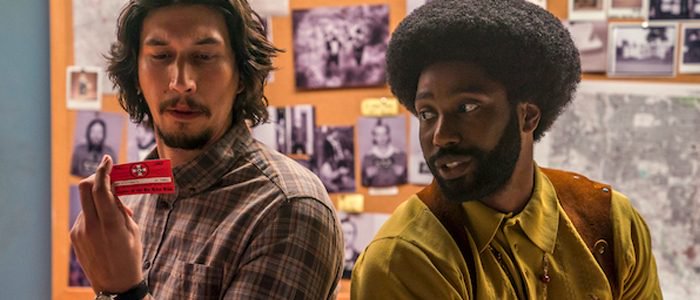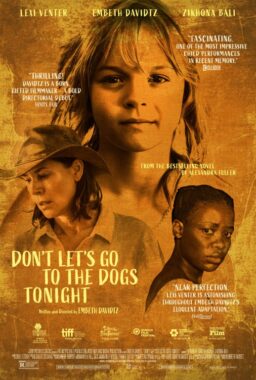If today’s competition films at the Cannes Film Festival have a common theme, it is: Who do you belong to; Who is your tribe, your family, your group? Spike Lee hits this theme with a sledgehammer, with “BlacKkKlansman,” “based on some fo-sure real shit,” according to an opening credit. It’s a funny, provocative profane polemic, a film with a dead-serious message under the satirical romp. It’s a crude, uneven, irreverent work that is stylistically akin to Lee’s controversial 2015 film “Chi-Raq” and “Da Sweet Blood of Jesus,” his 2014 remake of Bill Gunn’s “Ganja & Hess.” Interestingly enough, both these titles were left out of the selected list of Lee’s credits in the Cannes program booklet.
Opening with clips from “Gone with the Wind” and “Birth of a Nation,” “BlacKkKlansman” launches into faux outtakes for a propaganda film in which a chubby white supremacist is seen repeatedly flubbing his litany of Aryan-nation complaints as the voice of a prompter attempts to keep him on track. The film’s story, set in the ’70s, kicks in with Ron Stallworth (John David Washington) completing his job interview to become the first black cop in the Colorado Springs police department.
Lee gives the film a rough, low-budget look, akin to the sets and lighting of ’70s blaxpoitation. This is not a film that delivers fine acting performances or polished dialogue. It’s a send-up in which the comedy-drama is entirely in the service of political commentary, which Lee accomplishes in part with the reverse strategy of getting every conceivable bit of white-racist rant and n-word invective up on the screen and played for laughs.
Ron, the newly minted black cop is assigned by his white chief to infiltrate a public appearance in the town by Stokely Carmichael, aka Kwame Ture, to gauge the militancy of the local black population. Lee portrays the rousing Black Power speech in its entirety, the first of many instances in which he inserts fictionalized but serious tributes to milestones in black history into the comic framework of the film. Ron also meets the event’s organizer Patrice (Laura Harrier), an Angela Davis lookalike, who becomes the love interest.
Despite his rookie status, Ron convinces the department to let him lead an investigation into the KKK, aka The Organization. Putting on a white-man voice, he succeeds in contacting the Klan, spouting a line of racist lingo that is music to the ears of his contact. He soon receives an invitation to meet the boys in person, and therein lies the problem. A white Ron Stallworth is fabricated in the person of fellow cop Flip (Adam Driver), with black Ron calling the shots.
As black Ron continues contact by phone, eventually including hilarious conversations with David Duke (Topher Grace), and white Ron functions as the face of the operation, access to the Klan is wide open. There’s much buffoonery to come, and a KKK plot to initiate race warfare to be foiled, with a great deal of the comedy reliant on redneck caricatures and on white Ron’s ability to one-up his quarries in virulent racism. The best lines can’t be repeated in print.
Lee alternates his racial comedy and insight with his take on history. A baptism-like Klan initiation ritual ends with the gathered devotees lustily chanting “White Power,” and a cut to a black lecture meeting reveals the audience chanting “Black Power” with equal vigor. Lee sneaks a load of contemporary political commentary into the mouths of his characters, drawing rueful laughter from the many Americans in this Cannes audience as Trumpisms decades before their time make regular appearances. “The people of the United States could never elect someone like David Duke to be president,” says black Ron. “Coming from a black man, that’s pretty naïve,” answers his white fellow cop.
“BlacKkKlansman” concludes with a series of false endings, including a wishful-thinking celebration of cop camaraderie, and a contrasting Klan rally and cross-burning, but Lee is not finished yet. The film’s coda presents footage from current events including a 2017 White Lives Matter rally at the University of Colorado, the Charlottesville tragedy with Trump’s subsequent speech, and a final dedication to Heather Heyer.

The subject of belonging is at the center of the work of Japanese director Hirokazu Kore-eda, whose film “Shoplifters” premiered in competition today. His films are often about family, in its multiple and often compromised forms, whether that involves a broken one (“After the Storm”), an uneasily blended one (“Our Little Sister”), infants switched at birth (“Like Father, Like Son”), or abandoned children (“Nobody Knows”). With “Shoplifters,” he introduces more heartrending moral complexities than ever in an emotional story about a family that does the wrong things for the right reasons.
The Shibata family of five—made up of father Osamu (Franky Lily), mother Nobuyo (Ando Sakura), their pre-teen son Shota (Jyo Kairi), Nobuyo’s younger sister Aki (Matsuoka Mayu), and their crusty granny (Kirin Kiki, the prize-winning elderly star of Naomi Kawase’s “Sweet Bean”)—seems normal up to a point. They live on the precarious edge of insolvency in granny’s tiny apartment, and depend on her social security check to supplement meager incomes. Dad is a day laborer in construction, mom works in a commercial laundry, and sis, costumed as a sexy schoolgirl, pantomimes erotic acts for an outfit that serves chat-room clients.
It is immediately seen that shopping for food and other essentials is accomplished by way of shoplifting, and father and son are slick experts on an awesome scale. One night, on a jaunt home with a new haul of groceries for dinner, Osamu and Shota find a shivering five-year-old girl, possibly abandoned, looking for food in a garbage can. They bring her home and feed her, with the plan to find her parents later. Further examination by granny reveals the many scars and welts of recent abuse. They keep her instead, and call her Yuri.
Bit by bit, Kore-eda reveals many inconsistencies in this cozy setup. Shota doesn’t call his parents mom and dad, even when Osamu asks him to; Osamu and Nobuyo don’t appear to sleep together; granny pretends to live alone when a social worker comes calling. The back story of this family unit, which revolves around an ever-increasing array of cons, is at first only hinted at, while the film’s exploration of the growing bonds among its members develops as the emotional core.
Osamu has his flaws, but he’s seen as a caring dad who goes the extra mile. Aki comforts Yuri, whose arms are marked by the scars of deliberate burns, by showing the child her own similar scars. Granny soothes Aki with cuddles and bedtime hugs. Game-changing developments are in the offing. Yuri has been reported missing, as seen on the TV news, exacerbating the Shibata outlaw status. Granny dies suddenly, causing a new crisis and some horrifying developments that reveal a less warm and fuzzy side of the family.
Among the film’s precipitous turning points, Shota’s first inkling of a conscience comes just as Yuri begins to learn the family trade by watching him. The elderly owner of a convenience store, discerning that the little girl is about to steal, confronts Shota and hands him two big sticks of candy, saying, “Don’t make your sister do it.” Something new dawns on the boy’s face, not least of all triggered by the word “sister.”
As the result of a loving and selfless act, the law pounces, and each member of the Shibata family is exposed as someone very different than we have been led to believe. Kore-eda spares no irony or implied outrage at the way good becomes evil, the goal of child welfare becomes destruction, and love is understood too late to matter.












